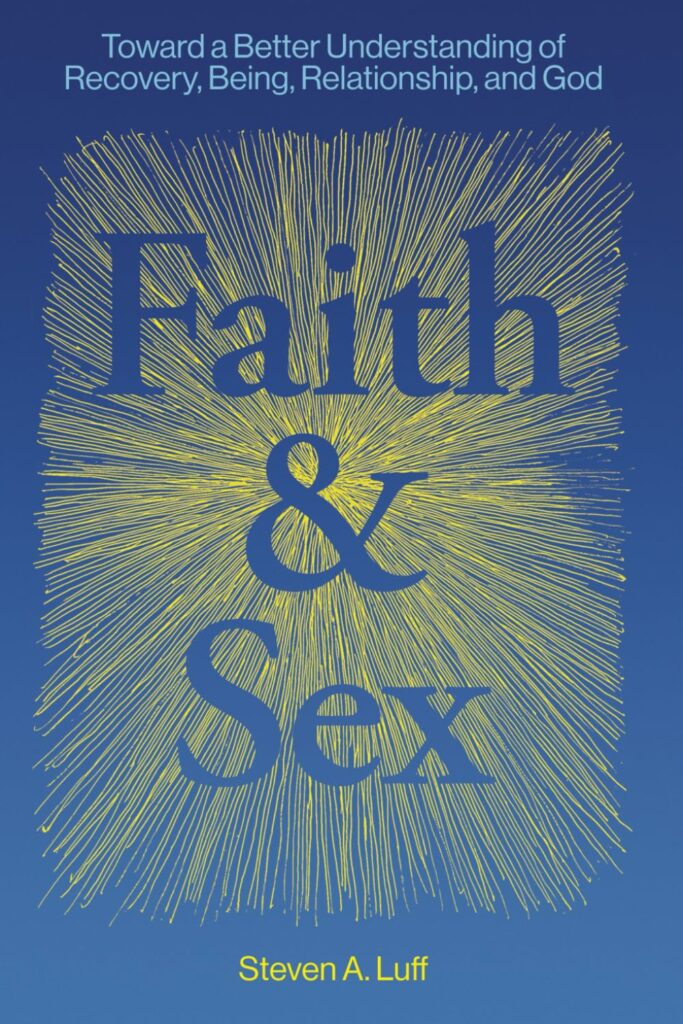Steven Luff, licensed family and marriage therapist, describes how he hit rock bottom before discovering keys to real change. In 2005, he ditched porn never to look back, but the “worst” was yet to come.
So how does one bounce back from life’s challenges without turning to negative coping strategies?

“Our best in life is choosing
wonder over control,
awe over self-judgment,
and curiosity over self-hatred.”
~ Steven Luff

Table of Contents
- Why read Faith and Sex
- Authenticity: the importance of understanding and practicing real change
- Practical steps toward porn recovery and real change
- Potential pitfalls on your journey of becoming
- How to reframe and honor your life story
- Boundary setting and blame-shifting
- Questions for Christians to consider
- Conclusion
Why read Faith and Sex?
Steven Luff’s wisdom stems from the fires of his real life challenges melded with his training in psychology and theology.
In Faith and Sex he shares a step-by-step manual for self-discovery and a robust guide to real change. People of all faith backgrounds will feel respected and included.
To begin, Luff clearly identifies the core battle: how to achieve real change.
Authenticity: the importance of understanding and practicing real change
Many struggle with repeated relapses back into porn. Asking – and answering – the questions below provides clarity and focus.
“Why is it so difficult to change?”
“…Or, consider what makes you so afraid to change? It’s got to be something much stronger that is holding you back.”
Identifying your fears related to change, notes Luff, is a step toward true freedom.
“Ultimately to change is to grow up,
and that is why it is so difficult.”
What practicing real change looks like – a bird’s-eye view:
“…the hard work with which we are all faced is taking the time, either through therapy, recovery groups, friendships, journaling, or meditation to get in touch with what we are feeling.
If we are feeling negative emotions such as anxiety or depression, it is our call to start making associations between this and the person we felt we needed to be in order to feel fundamentally connected.
And then start on the courageous journey of finding new connections, ones that enrich and support.”
Practical steps toward porn recovery and real change
So many have tried over and over again to quit porn. What derails us?
Stages of change:
As Luff lays out the stages of change, it’s very relatable to our customer’s challenges. Many confront what he describes as “the Wall”.
“Here it becomes evident that change requires a bit more than just rearranging the same old furniture in the same old house.”
Luff says “Real Change” happens when, “We realize that the old life doesn’t work, and that change requires a new one.”
Most importantly, real change requires choices.
“In the Wall stage, a choice needs to be made: either remain in a psychological prison, or set ourselves free to live our own lives.”
“The trouble is, many of us don’t know what our own lives are. We have never been given a chance to explore our own abilities, talents, or emotions.”
“A basic component of the Wall is isolation.”
To break down the Wall, community plays a vital role in porn recovery and real change.
Mindfulness and community
“Mindfulness is a kind of curiosity
about one’s place and activity in the world.”
Here Luff dives into his personal philosophical approach – parts of which he admits are controversial. But, self-examination of your background, your genes, how you’re wired, and how you can “rewire” those genes makes scientific sense.
One tried-and-true solution to this rewiring process is community.
“If the inability to trust others is the original cause of acting out behavior, then the process of change requires a lot of vulnerability with people.“
“Community isn’t just a good idea.
Rather we are psychologically designed for it all the way down
to the most essential and deep parts of our brains.
With connections we feel good, are playful, and thrive.
Without connection, we feel anxious, depressed,
and worst case scenarios, suicidal.”
Dealing with depression
In order to move past depression, and reach for individuation and contentment, accepting our past is needful, says Luff.
“Depression is rigid dependency on specific earthly, fallible people. Anger is rigid dependency on specific earthly, fallible people.”
“Traveling from anger into individuation and contentment means accepting the reality that bad things happen
and have just so happened to us,
and believing that we can nonetheless do something
constructive now with what we have.”
Individuation
Luff describes the term individuation:
“Individuation is the ability to recognize yourself as a unique entity apart from others while remaining in meaningful relationship with others…
It is the ability to say to yourself, “This is who I am independent and regardless of what has happened or will happen to me’.”
This journey of positive self-discovery requires you to tackle challenges that could hold you back.

Potential pitfalls on your journey of becoming
Fear
Luff challenges us to identify unique fears secretly driving our bad habits.
“What I have discovered is that fear holds the key to becoming who God created us to be. What frightens us holds the key to our unique relationships with God. Discover what frightens you and push into it…For our fears represent a departure from the expectations of others.”
“What would happen if we persisted in facing our fears
and pushed through to the other side,
even though we don’t know where this journey is taking us?
What would happen?We would discover ourselves.”
Facing fears in a safe environment is vital for abuse survivors.
“… but dismantling fear can also be harrowing, especially if you have been traumatized by abuse or neglect. If you choose to face your fears, please do so with unconditionally loving support. This is the job of a good therapist, support or community group, and church.”
Vulnerability and Illusions of Change
Going back to “The Wall Stage” discussed in chapter 3, Luff reminds us that we must be open to confront our personal “illusions of change.”
He describes porn use as reaching for an illusion to meet our “essential human need for connection.”
Luff reminds us that: “… not addressing illusion and fantasy for what it is allows underlying conditions to go untreated.”
“Real Change, on the other hand, is changing behavior because you have located and dissolved the illusions that have allowed you to feel artificially connected.”
“…one must go through the refining process to determine
what is illusion and what is real,
what is openness and honesty,
and what is secrets and lies.”
At the end of chapter 8, don’t miss his 5 success steps for climbing “The Wall” and being open, honest, and vulnerable on a journey to porn recovery and real change.

Perfectionism
Are you ruled by the “shoulds” in your life?
“There is a strong connection between perfectionism and compulsive behavior.”
Luff names porn use and anonymous sex as compulsive behaviors often (perhaps shockingly) rooted in perfectionism.
“The only answer to perfectionism is finally to submit to life without the deceptions of illusions and to accept that life will change us as much as we try to change it.”
“There is no perfection in Real Change because Real Change is about accepting our imperfections, even reveling in them (2 Cor. 12:9).”
To overcome perfectionism, Luff encourages you to keep a “should sheet”, noting which “shoulds” are healthy or unhealthy (often ones that cause you harm emotionally). Which ones lead to anxiety and depression? The goal is helping you choose which of your “shoulds” to ditch
How to reframe and honor your life story
Unresolved conflicts haunt many of us. It’s especially hard when “something happened to us that is too shameful, too difficult to face.”
“Reauthoring” your life is possible as Luff says, “… there is always the option of playing with the meaning we have given past events, seeing our current situation differently in the light of that, and then constructing a future end to our story that makes more sense and also provides us hope.”
Luff opens the door to a hopeful view of integrity!
“In most circles, the word integrity implies meeting a list of criteria…
I’m more interested in an organic, bottom-up perspective: having integrity because you are an integrated person. In this sense, integrity is the product of something else happening within you.Integrity happens because of a fundamental shift in who you are as a person.”
As you begin to focus on eternal Love, “Real Change” transforms you from the inside out.
Authenticity and integrity then revitalizes every area of your life.

Boundary setting and blame-shifting
Dealing with conflict well is a key life skill. Luff names this process as “non-violent resistance”. Others call it boundary setting.
Setting boundaries – non-violent resistance to conflict
Luff explains the core of non-violent resistance with 4 key components which starts by recognizing:
“…we all have a right, when in a relationship, to be seen, heard, acknowledged, and provided equal standing…
It also means respecting other people’s boundaries.”
You need to focus or “center” on your own growth because, “you cannot control another person’s behavior, only your own.”
Blame-shifting 101
In chapter 12, “The Devil Made Me Do It”, Luff confronts another sensitive topic.
“To label our sexual desires and the objects of our sexual desires as Satanic can be a cop out.”
He notes that fear of Satan can hijack you from reclaiming your power and freedom or blind you to the real triggers you need to confront and overcome.
“I’ve learned that my job as a therapist is to be the ‘party pooper.’ My hope is that in helping my clients spoil the party,
ruin the illusion or fantasy,
they will begin to integrate themselves,
become the same person in all situations,
not one person when alone
and someone else when they are at work,
out with friends,
or home with family.”
This includes accepting responsibility and choosing accountability.
However, Luff offers the following caveats from personal experience:
3 wrong reasons to get an accountability partner:
- To demonstrate your sincerity to change even if you’re not serious about it
- To use your accountability partner as a silver bullet “to ward off the werewolf of sexual temptation”
- To recreate a “parent-child relationship” expecting the accountability partner to shame you, judge, belittle, or “police” you into good behavior
Questions for Christians to consider
The final chapters of Steven Luff’s book directly challenges Christians. If those who love Jesus refuse to change, then we should just stop pretending we’re following Him.
Instead, we can be constantly discovering that God is inviting us to become more and more of the person we were created to be.
“To engage in this walk with God is to change the world,
because in responding to reality through faith
and trust versus fear and dishonesty,
we no longer need to control others,
and we no longer allow others to control us…”
Always remember, as Luff points out that, “God is about wonder, not answers…
“Find a community where we cannot know all of the answers, where we are all fellow travelers asking questions, where we allow God to transform our lives instead of conditionally loving people or our substances of abuse and compulsive behaviors including drugs, alcohol, and with sex…As human beings walking this earth we don’t know the absolute truth. Only God does.”
Conclusion
One of the best benefits of being accountable is the peace of mind it brings because you’re done with living a double life.
“Integrity is the product of Real Change.”
Steven Luff speaks to his fellow believers in the faith community:
“As Christians, it is not through our behavior that we strive to please God or anyone else. Instead, what transforms us is our receptivity to, and meditation on, God’s unconditional love and acceptance of us, exemplified through Jesus’s action on the cross. (Rom. 8:1-4)”
Loving others unconditionally is an essential part of the accountability partner relationship encouraged by Ever Accountable.
We hope this overview of a large portion of Faith and Sex will wet your appetite to read this book. We also encourage you to continually pursue “Real Change”.
For more information on Steven Luff, LMFT, he can be reached at: Faith and Sex Center.
His book is available here: https://www.amazon.com/Faith-Sex-Understanding-Recovery-Relationship/dp/B0CV5F1WT9/
14-Day Free Trial
Protection From Pornography
Change your habits, change your life: Start our 14-day free trial to help get rid of pornography for good.




